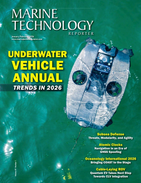Marine Technology Reporter Blogs - hybrid
Future ROV Technology

Remotely Operated Vehicles (ROVs) perform a wide range of tasks in a variety of underwater scenarios ranging from research to offshore oil industry support, military operations and S&R. Technological developments, have greatly enhanced their scope of operation including harsh environment operations, such as deepwater and Arctic ops. As oil operations went to deeper waters, so did ROVs, which became a key asset in subsea operations such as pre-salt development and has also been increasingly substituting divers below 300 meters, although saturation diving is very much alive and will also continue to be an important asset. The ROVs of the future will have increased intelligent autonomous behavior and will use logic driven circuitry for routine tasks like turning valves…
Deepwater Riser Technology

Un-coupled riser systems are increasingly being used in deepwater and ultra-deepwater field developments, where harsh environments predominate. Hybrid Riser Towers (HRTs) are recognized to have significant benefits for deepwater riser applications in terms of flow assurance, thermal performance and robustness of layout. This latter issue is especially significant when a large number of risers are considered. An HRT provides the required flexibility by avoiding a crowded layout and allowing a progressive deployment. The concept is applicable to deepwater and ultra-deepwater, and to spread-moored and turret-moored FPSO installations. The Single Hybrid Risers (SHR) in its Single or Pipe-in-Pipe versions…
Hybrid Bit Technology - Smith BIts/SLB

In a Technical Paper from 2013, Slim Hbaieb and Michael Azar of Smith Bits, a Schlumberger Company explained the advantages of an innovative hybrid bit design that had been tested successfully in Brazil’s pre- salt formations. The main advantages were that the hybrid bit mitigated geological and formation uncertainties, and eliminated the need for several trips to replace damaged bits. Normal PDC (polycrystalline diamond compact) bits can drill pre-salt carbonate rocks effectively until the cutters are damaged by problematic chert inclusions. The hybrid bit is capable of similar ROP (rate of penetration) and run lengths as standard PDC and allows the operator to achieve a long run at high ROP when no silicate inclusions are present.
The Future of Maritime LNG Propulsion

The use of liquid natural gas (LNG) as a marine fuel is increasing as new environmental regulations are enacted and bunkering facilities are expanded. Some forecast predict that around 10,000 vessels could be adopting LNG propulsion by 2020 compared to less than 100 today and classification society Det Norske Veritas had predicted that LNG would become the dominant fuel source for all merchant ships within 40 years. The main reason for this expected growth is because of strict emission regulations requiring the reduction of sulfur oxides (SOx) and nitrogen oxides (NOx) to 0.1 percent in Emission Control Areas (ECAs) by 2015 and 0.5 percent globally by 2020.
LNG Power for OSVs

Rolls Royce and DNV engaged in a joint study of different fuel and engine configurations. The vessel selected for this study was the Rolls Royce designed UT 776 PSV. In the study, four alternative power system arrangements were considered, with two gas tank versions. The gen-sets were powered by various sizes of Bergen C-series diesel and gas engines and the dual fuel engine was a commercially available unit. For diesel and hybrids the assumption was that the exausts would have a SCR system giving a constant value of NOx reduction of 75%. In terms of cost, the diesel was the winner in the study as there is the added expense for other solutions of insulated LNG tanks.
CYBERNETIX Eyeing Pre-salt Subsea Service Contracts in Brazil

Marseille-based Cybernetix is a major European provider of remotely operated or robotic systems for intervention in subsea systems, operating in 15 countries. The company launched its Brazilian subsidiary in December 2010, located in Rio de Janeiro. CYBERNETIX Produtos e Servicos Ltda. "CYBERNETIX do Brasil" was born to compete for subsea contracts in Brazil, specifically aiming at services for the deepwater subsea pre-salt plays being discovered and also for those plays going through EWTs or already in first phases of production, as some pre-salt plays already are. Structural integrity monitoring for offshore units along with robotics equipments for inspection…

 February 2026
February 2026



